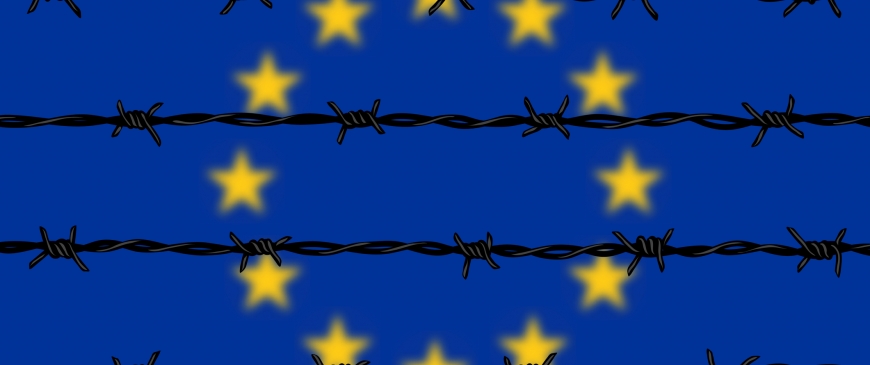
The collapse of Schengen would have only two winners: Terrorists and populist parties
Unprecedented numbers of asylum seekers making their way into Europe have led some member states to close their borders. Three major terrorist attacks in just over a year have added to the sense of mistrust. Schengen, the 1995 agreement that abolished national border controls in parts of the EU, was not designed for such crises, and is near breaking point. As large flows of refugees continue, there is a real risk of national borders being permanently reinstated across Europe unless the EU can find a lasting solution to the crisis.
Why does it matter? For one thing, Schengen has been good for Europe’s economy. The agreement covers 400 million people, and the abolition of borders has boosted trade between participating countries (all EU 28 except Britain, Ireland, Romania, Bulgaria and Cyprus, plus Switzerland, Norway and Iceland).
Schengen’s demise would also undermine citizens’ trust in their governments, give a boost to populist parties, and endanger the democratic consent underpinning the EU’s freedoms. The UK, which is not participating in the agreement, would have no opt-out from the aftershocks set off by its downfall.
Most EU members want to save Schengen but it is not an easy task. A long-term solution will require common rules and institutions governing the Schengen area’s migration and security policies; but these will take years to negotiate and they are unlikely to be agreed in the state of panic that currently reigns.
In the meantime, the EU should take some emergency ad-hoc steps. These should focus on securing the external border and processing asylum seekers more speedily. That would enable countries to offer asylum to vulnerable people while keeping out those who pose a security threat. Ultimately, the EU should aim to offer asylum seekers functioning legal routes to move to Europe.
In essence the EU needs to do four things:
- Get migrant processing centres in Greece and Italy – the so-called "hotspots" – working properly, by providing them with the necessary infrastructure and resources.
- Make sure all EU countries take their fair share of refugees. Quotas should be allocated on the basis of the relocation mechanism suggested by the European Commission in September 2015, which takes into account how rich and how populous member states are. The EU should make sure that the distribution of asylum seekers among member-states is done in an orderly manner, and that people have been properly screened before they are sent elsewhere.
- Set up EU-operated resettlement centres, not only in Turkey, but also in other countries such as Egypt, Jordan and Lebanon, close to where refugees come from. Unlike hotspots, these should be a permanent, bigger and better organised point of first arrival for asylum seekers fleeing war-torn countries. In these centres, EU authorities would select those who have a legitimate basis to apply for refugee status in Europe. But such centres must not turn into a de facto detention centre: applications must be processed as quickly as possible, and asylum seekers awaiting a decision should be kept in humane conditions.
- Send as many failed asylum-seekers home as possible with improved readmission agreements. A sound "return" system is crucial for the EU’s asylum mechanism to work: by deporting those with no right to be in Europe, member-states can focus on those in real need of protection. A fair and effective return policy also deters smugglers. To improve the record on returns, the EU should focus on concluding ongoing negotiations on readmission agreements, and on making existing agreements work better. It’s also important to reshape the incentives the EU gives to third countries to accept failed asylum seekers, as shown by the recent EU-Turkish deal.
But managing the inflow, distribution – and when appropriate, return – of asylum seekers and migrants is only one part of the equation. The lack of a secure external border also makes it easier for criminals, including jihadists, to enter, move across and leave Europe by posing as migrants, further eroding people’s trust in the Schengen system.
To counter this threat, the EU needs to improve the screening of people entering the Schengen area to weed out potential terrorists. One priority is to make better use of existing databases, such as the Schengen Information System, which contains data on wanted and suspicious people, in combination with Eurodac, a database storing the fingerprints of asylum seekers.
Frontex, the EU agency currently managing the cooperation between national border guards, is not allowed to use security databases and cannot even purchase its own fingerprinting machines. Security screening at the border will improve if and when the proposed European Border Guard – with access to security databases – starts operating.
Despite resistance in some European capitals, a true European border force would help the EU to strengthen its external border, because it would support countries in managing their borders in times of crisis, and reduce the risk of terrorists and other criminals getting in and out of the Schengen area.
The collapse of Schengen would have only two winners: terrorist organisations and populist parties. Europe’s citizens and businesses would be the losers.
Camino Mortera-Martinez is a research fellow at the Centre for European Reform
